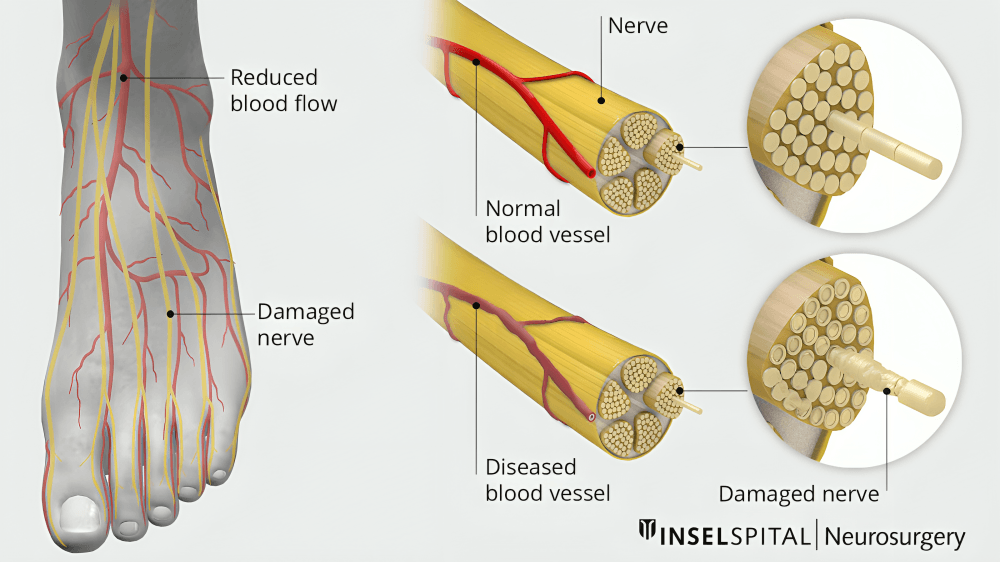
“
Neuropathy is a condition resulting from nerve damage, affecting sensory, motor, or autonomic nerves. It brings discomfort through pain, numbness, or weakness, often rooted in underlying diseases. Understanding the symptoms and causes of neuropathy is crucial for early diagnosis, effective treatment, and preventive care. Whether caused by diabetes, infections, toxins, or genetic factors, neuropathy can severely impact quality of life. 1
1
”
Dr. Jean-Martin Charcot, a 19th-century neurologist, identified nerve disease symptoms and emphasized observation, helping lay the foundation for diagnosing neuropathy linked to diabetes.1
One of the most common symptoms of neuropathy is a gradual onset of numbness and tingling in the hands or feet, eventually spreading upward toward arms and legs if untreated or progressive. 2

Neuropathy can result from long-term diabetes, where prolonged high blood sugar levels damage nerve fibers, especially in extremities, leading to pain, burning sensations, or total loss of feeling.
Vitamin B12 deficiency is a well-known cause of peripheral neuropathy. It impairs myelin sheath formation, which protects nerves, leading to balance issues, tingling, and mental confusion over time. 3
Chemotherapy-induced neuropathy is a common side effect in cancer patients, as powerful drugs damage healthy nerves while attacking cancer, leading to numbness, weakness, or sharp, shooting pain. 4
Infections such as Lyme disease, shingles, or HIV can inflame nerves, causing sharp pain or chronic discomfort. Viral or bacterial attacks often result in nerve tissue degeneration. 5
Autoimmune diseases like lupus or rheumatoid arthritis can trigger the body to attack its own nerves, causing inflammation and classic neuropathic symptoms such as stabbing pain and severe weakness. 6
Neuropathy can be hereditary. Genetic disorders like Charcot-Marie-Tooth disease lead to abnormal nerve structure or function, often causing foot deformities, gait problems, and progressive muscle loss in youth. 7
Exposure to toxins like heavy metals (lead, mercury) or industrial chemicals can damage nerves directly, especially in occupational settings, leading to sensory disturbances or progressive nerve degeneration. 8

A stabbing, burning, or electric shock-like pain that worsens at night is often reported in neuropathy sufferers, particularly those with diabetic or idiopathic neuropathy with no known clear cause.
Kidney failure leads to uremic neuropathy when excess waste builds up in the blood, poisoning nerves and causing symptoms such as fatigue, numbness, and muscle cramps in the legs and feet. 9
Medications like antibiotics, antiviral drugs, or heart treatments can trigger neuropathy in some people, especially when used long-term or in high doses, by interfering with normal nerve transmission. 10
People with hypothyroidism may experience neuropathy symptoms due to slowed metabolism, which causes fluid buildup and pressure on peripheral nerves, resulting in tingling, pain, or cold, numb limbs. 11
Chronic inflammation is a hidden contributor to neuropathy. It damages nerves over time by breaking down protective coatings, leading to misfiring signals, unusual sensations, or intense, shooting pain. 12
Sudden trauma such as car accidents or sports injuries can cause direct nerve damage. Crushed or severed nerves can result in localized or widespread pain, immobility, and sometimes irreversible numbness. 13

Neuropathy can cause hypersensitivity to touch. Even light contact, like a bedsheet brushing against skin, may trigger intense pain, a hallmark symptom called allodynia, especially in sensory neuropathies.
In rare cases, tumors pressing against nerves or infiltrating nerve tissue can lead to neuropathy. This may result in pain, weakness, or dysfunction, depending on the location and growth rate of the tumor. 14
Guillain-Barré Syndrome is a rare condition where the immune system attacks peripheral nerves. This autoimmune reaction can cause rapid-onset neuropathy and even paralysis if not treated quickly. 15
People with chronic liver disease may develop neuropathy due to metabolic imbalances or nutrient deficiencies, affecting leg and hand sensations, muscle control, and coordination over time. 16
Dr. Thomas Willis, a 17th-century neurology pioneer, proposed that the brain and nerves function as a system, anticipating how conditions like diabetes can lead to nerve damage.17


